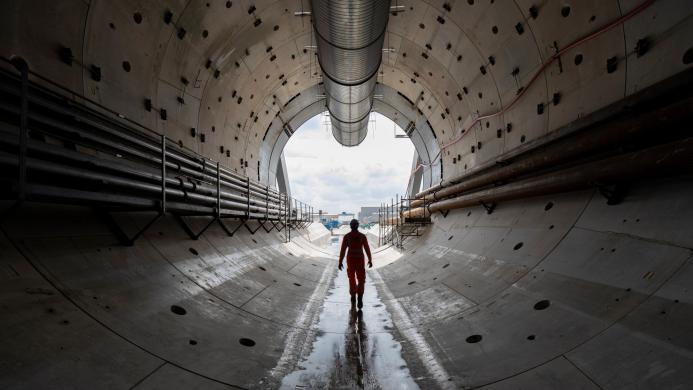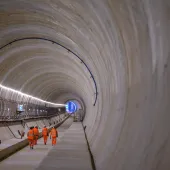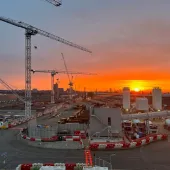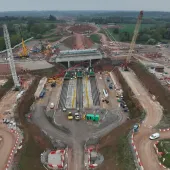Over half of tunnels completed on HS2
HS2 has achieved a pivotal milestone in its construction efforts, with over half of the tunnels now completed, marking a significant step forward for the ambitious high-speed railway connecting Birmingham and London.
HS2 is at the peak of its construction activity, with 31,000 employees and two of the five twin-bore tunnels fully excavated, with work on the remaining two well underway. The scale of progress is evident across the 350 separate worksites between London and the West Midlands.
In total high-speed trains will travel through 44.2km of twin-bore tunnels, which accounts for nearly 20% of the 225km route. This equates to a total of 88.4km of tunnel being excavated and built by HS2's fleet of tunnel boring machines (TBMs), with concrete forming the structural backbone of these tunnels.
Over 50%, or 47km, of tunnels have been excavated and built, surpassing the length of tunnels constructed for the Crossrail line beneath London.
Each TBM operates as an underground factory, excavating tunnels, lining them with pre-cast concrete segments, and moving forward at an average speed of 12 to 16m per day.
Upon completion of the tunnel drives, HS2 will progress to the next stage of the tunnelling project, which includes completing vital features such as cross-passages, vent shafts, and portals. Subsequently, the internal fit-out of the railway system, including power, track, and signalling will be undertaken to enable high-speed trains to operate safely.
Several tunnels have already been completed, including the 1.6km-Long Itchington Wood Tunnel in Warwickshire and the 16km Chiltern Tunnel. Excavation works are also underway for the Northolt Tunnel in London and the Bromford Tunnel in the Midlands.
Preparatory works for the Euston Tunnel are nearing completion, with two TBMs currently being manufactured and tested. The government is exploring various funding mechanisms for the delivery of this tunnel.
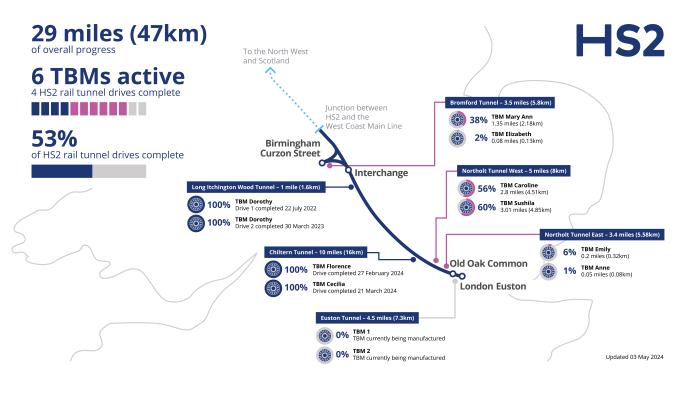
The machines are operated by crews of around 17, supported by teams managing logistics and maintaining the smooth progress of the tunnelling operation. Furthermore, numerous individuals are involved in producing concrete tunnel wall segments and processing materials from the tunnels for reuse elsewhere on the project.
Jackie Roe, HS2’s Civils Delivery Director said: “The halfway point for our tunnelling programme is a fantastic milestone, but we’ve still got a lot of work to do on the tunnels, including all cross passages, vent shafts and then fitting them out with the critical rail and power systems that will eventually allow trains to safely operate.
“This is a significant step towards delivering the country’s new high-speed railway, which will provide faster and far more reliable journeys, while almost doubling capacity on the most congested part of the West Coast Main Line.”
The remainder of the HS2 route includes six cut-and-cover tunnels totaling 8.4km and 112.6km of cuttings. With over half of the track below ground level, HS2 is set to improve connections between London and the West Midlands, significantly enhancing travel efficiency and stimulating economic growth, all made possible by the robust foundation of concrete construction.
The latest figures coincide with a quarterly analysis revealing a record number of jobs supported by HS2, with over 31,000 individuals employed directly or through the supply chain. Additionally, the project has created over 1,500 new apprenticeships and provided employment opportunities to over 4,200 formerly unemployed individuals since 2017.

